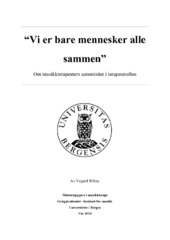"Vi er bare mennesker alle sammen" Om musikkterapeuters autentisitet i terapeutrollen
Master thesis
Permanent lenke
https://hdl.handle.net/1956/17787Utgivelsesdato
2018-06-08Metadata
Vis full innførselSamlinger
Sammendrag
Denne kvalitative studien utforsker muligheter og utfordringer knyttet til musikkterapeuters autentisitet i møte med klienter i psykisk helsevern. Målet med studien er å undersøke musikkterapeuters erfaringer med å bruke sin egen autentisitet som et terapeutisk verktøy, og hvilke utfordringer som er knyttet til dette. Tre musikkterapeuter sin erfaring rundt temaet utforskes gjennom tre separate semistrukturerte forskningsintervjuer. Gjennom en hermeneutisk analyse av intervjuene blir både muligheter og utfordringer identifisert og diskutert i lys av ulike humanistiske, ressursorienterte og relasjonsorienterte teoriperspektiver. Mulighetene er knyttet mot å skape likestilte og gjensidige relasjoner og tilrettelegge for gode relasjonelle opplevelser med klienter. Utfordringene er knyttet mot etiske implikasjoner for klienter og utfordrende relasjonelle situasjoner for terapeuten. Studien viser også at informantene erfarer flere muligheter enn utfordringer ved en autentisk terapeutstil. Det er ingen forskning som eksplisitt tar for seg musikkterapeuters autentisitet som terapeutisk verktøy. På bakgrunn av dette, og at musikkterapeuter autentisitet virker å være en grunnleggende del av deres terapeutiske praksis, konkluderer studien med at musikkterapeuters autentisitet må forskes mer på. This qualitative study explores the possibilities and challenges associated with the authenticity of music therapists in their work with clients in mental health care. The aim of the study is to investigate how music therapists experience their own authenticity. Can it be used as a therapeutic tool? And are there challenges associated with an authentic approach to the role of a music therapist? The topic is explored through three separate semistructured interviews with three music therapists. A hermeneutic analysis was conducted and several possibilities and challenges arose in the process. The possibilities were related to the humanistic goal of creating egalitarian and mutual therapeutic relationships, and facilitating meaningful relational experiences with clients. The challenges were connected to ethical implications for clients and challenging relational, and work-related, situations for the therapists. In the analysis it was also found that the music therapists seemed to identify and associate more possibilities than challenges to their own authenticity as a therapist. The themes are discussed in light of various humanistic, resource-oriented and relational theories. There is no research that explicitly addresses a music therapist’s authenticity as a therapeutic tool. On the basis of this, and the fact that the music therapists own authenticity seems to be a fundamental part of the informants therapeutic practice, the study concludes that there is more research needed on this topic.
